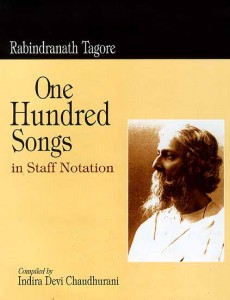Poetry in Translation (CCXXIX): Rabrindranath TAGORE, (1861-1941), INDIA, “My Song”, “Cântec”
My Song
Rabrindranath Tagore
(1861-1941), India
This song of mine will wind its music around you,
my child, like the fond arms of love.
The song of mine will touch your forehead
like a kiss of blessing.
When you are alone it will sit by your side and
whisper in your ear, when you are in the crowd
it will fence you about with aloofness.
My song will be like a pair of wings to your dreams,
it will transport your heart to the verge of the unknown.
It will be like the faithful star overhead
when dark night is over your road.
My song will sit in the pupils of your eyes,
and will carry your sight into the heart of things.
And when my voice is silenced in death,
my song will speak in your living heart.
Cântec
Rabrindranath Tagore
(1861-1941), India
Cântecul meu, copile, îşi va învălui melodia în jurul tău
întocmai braţelor iubirii.
Cântecul meu, îţi va atinge fruntea
cu sărutul binecuvântării.
Când vei fi singur, mă voi aşeza lângă tine
şoptindu-ţi în ureche, când vei fi în mulţime
te voi ocroti cu mândrie.
Cântecul meu va da aripi viselor tale,
purtându-ţi inima la limita misterului.
Îţi va fi steaua călăuzitoare
când întunericul nopţii te va cuprinde.
Cântecul meu va sălăşlui în ochii tai,
să-ţi călăuzească privirea spre misterul vieţii.
Iar când vocea mea va adormi, în moarte,
cântecul meu se va auzi în inima ta.
Romanian version by:
Constantin ROMAN,
© 2013, Copyright Constantin ROMAN, London
 SHORT BIO: A native of Bengal, Rabindranath Tagore (1861-1941), was educated at home; and although at seventeen he was sent to England for formal schooling, he did not finish his studies. Gandhi, the political father of modern India, was his devoted friend. Tagore was knighted by the ruling British Government in 1915, but within a few years he resigned the honour as a protest against British policies in India.
SHORT BIO: A native of Bengal, Rabindranath Tagore (1861-1941), was educated at home; and although at seventeen he was sent to England for formal schooling, he did not finish his studies. Gandhi, the political father of modern India, was his devoted friend. Tagore was knighted by the ruling British Government in 1915, but within a few years he resigned the honour as a protest against British policies in India.
With his translations of some of his poems he became rapidly known in the West. In fact his fame attained a luminous height, taking him across continents on lecture tours and tours of friendship. For the world he became the voice of India’s spiritual heritage; and for India, especially for Bengal, he became a great living institution. In 1913, Tagore was awarded the Nobel Prize for Literature.



No Comments so far ↓
Like gas stations in rural Texas after 10 pm, comments are closed.